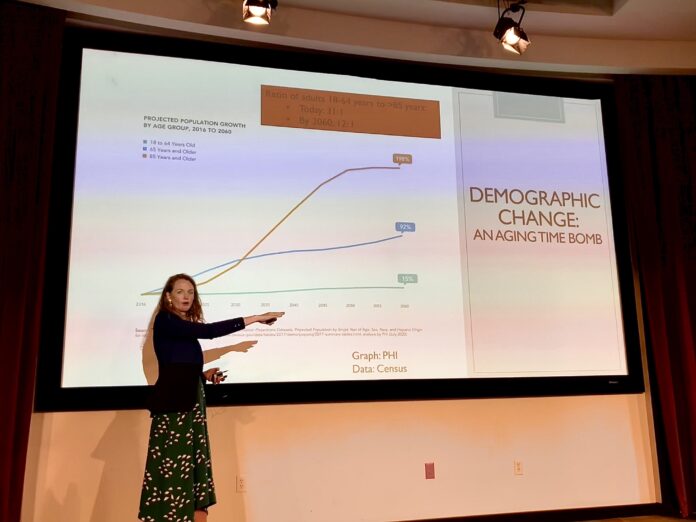
UNLV students were the first public audience to view artificial intelligence research from Molly Kinder’s two new projects on Nov. 7. One of the projects Kinder has started is on elderly care and the impact of care workers on the economy. The second project is how artificial intelligence impacts the workforce, particularly for women. Kinder’s lecture, “Headwinds and Tailwinds: The Present and Future of Work for Women,” was part of a public lecture series hosted by Brookings Mountain West.
Looking to the future of work for women, Kinder warns that artificial intelligence poses a risk to women working in administrative roles. With all the research that has come out so far, these sectors are most at risk.
Kinder spoke on the drawbacks that women are facing in the labor market. Kinder says, “Women are very much in the lowest-paying jobs in the economy.” Women make up the majority of the care workforce, often working as nursing assistants, home care workers, and child care workers. Secondly, the gender pay gap still exists. Women and men holding the same jobs are paid similarly; however, sectors that men primarily make up (business and construction) earn more than sectors that women primarily make up (teachers, childcare, and administration). Finally, there still exists a lack of childcare investment. Childcare workers are paid poverty wages, and at the same time, families cannot afford childcare.
At the height of the pandemic, Kinder researched frontline essential workers. She focused not on doctors and nurses, but on grocery workers, certified nursing assistants and hospital janitors. Kinder focused on the cognitive dissonance in the language surrounding these essential workers as “heroes” or the “backbone of society.” Yet they are paid below a living wage, and many went without hazard pay.p
In the presentation, Kinder spoke on some notable achievements women have made in the labor market. Firstly, women are the fastest returning workers after the pandemic. Secondly, remote work has allowed women with young children (children under 4 years old) to return to work post-pandemic. The unfortunate downside is that remote work is primarily available to women in office jobs, not service jobs, where women of color make up the majority. Finally, women outnumber men on college campuses and among degree holders.
Along with giving a public lecture, Kinder also visited various classes, including a foreign policy class. Louie Arnel Cano, an honors and political science student, attended the lecture and was in the foreign policy class, saying, “Molly Kinder’s lecture was an interesting lecture that, for me at least, introduced new perspectives when considering the labor shortage and approaches to solving gender disparity in the workforce. But what really caught my attention was her introduction to foreign policy and the new opening fields of the interactions between [artificial intelligence] and public/foreign policy. As an aspiring student in the field of legal studies and public policy, this introductory lecture on the opportunities and pitfalls of [artificial intelligence] was incredibly informative, and I hope others were able to learn as much as I was able to. I thought Molly was an amazing guest speaker and got students to engage in an increasingly relevant topic while inspiring new and current public/foreign policy students to chase after their dreams.”
Students also learned from Kinder how to pursue a career in policy. Kinder shared how she moved to Washington D.C. with only $5,000 in her bank account. Kinder spoke about walking through the doors of every think tank on Massachusetts Avenue, offering to work for free and trying to get a foot in the door. After speaking about her early career, Kinder went on to talk about her research at The Brookings Institution.
The final Brookings scholar to come out to UNLV is Vanda Felbab-Brown, who will speak on global implications of the opioid crisis from Nov. 27 to Nov. 30.
